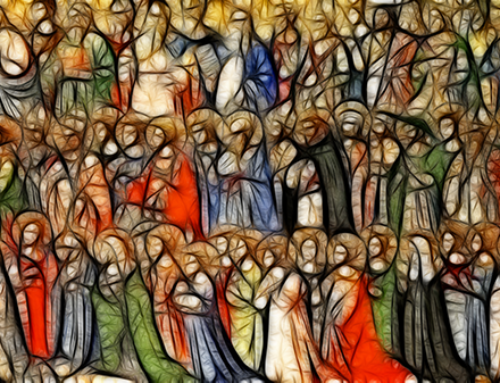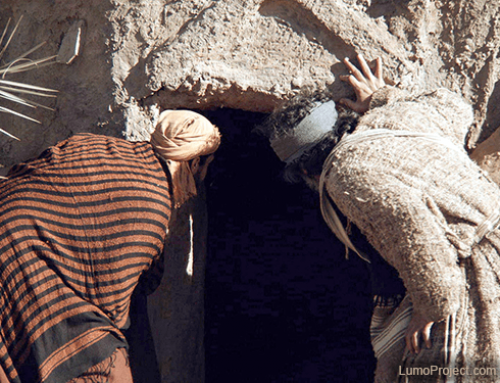 It began with the scourging.
It began with the scourging.
The Romans were experts at devising torture. A scourge was not just a whip; it was designed to dig into and tear up the flesh. The scourging Jesus received was so severe that He was unable to carry His own cross to His execution (Mark 15:21, Luke 23:26).
And crucifixion was more than just a public execution. It wasn’t relatively quick like a hanging or beheading or lethal injection. Crucifixion was carefully designed to humiliate, to inflict excruciating pain, and especially to prolong the suffering of the victim before inevitable death.
The pain Jesus suffered on the cross was beyond imagining.
The writers of the Gospels didn’t go into detail; they didn’t need to, because in those days everyone knew. John simply writes, “Pilate then took Jesus and scourged Him” (John 19:1). Everyone knew what it meant to be scourged by the Romans. And everyone knew what it meant to be crucified. Every man, woman and child walking into Jerusalem passed by rows of crosses where criminals suffered and died for all to see.
It’s easy for us to read words like scourging and crucifixion and have little grasp of the reality. Over the years, I have learned about what those words mean. But as I read again the four Gospel stories of Jesus on the cross, I find myself drawn, not to the pain hidden in those seemingly simple words, but to details that testify of Jesus’ character.
Jesus refused the mixed wine.
And when they came to a place called Golgotha, which means Place of a Skull, they gave Him wine to drink mixed with gall*; and after tasting it, He was unwilling to drink. (Matt. 27:33-34; *or myrrh, see Mark 15:23)
Why didn’t Jesus drink the wine? The substance it contained was an analgesic. It would have taken a little of the edge off the pain. But Jesus refused to compromise on His mission. He refused to even consider lessening the pain.
At first glance, one might think, why not? What’s wrong with lessening the pain? It wouldn’t keep Him from dying on the cross for our sins, would it?
But Jesus didn’t only die for us, He suffered for us. In refusing the wine, Jesus refused to put Himself first. He chose to forego the mixed wine in order to keep His mind and His heart fully committed to the task before Him.
Jesus provided for His mother.
When Jesus then saw His mother, and the disciple whom He loved standing nearby, He said to His mother, “Woman, behold, your son!” Then He said to the disciple, “Behold, your mother!” From that hour the disciple took her into his own household. (John 19:26-27)
Jesus was the eldest son. His mother, Mary, was a widow. In Jewish culture, it was the responsibility of the eldest son, in the absence of the father, to provide for the care of His mother and any unwed sisters. Even from the cross, Jesus was mindful of the needs of others. He demonstrated integrity and love for His family by appointing John to step into the role of first-born son and provide the care He would no longer be able to give.
Jesus prayed for His enemies.
Jesus’ love for others was foremost in His mind and heart. Even as He was being nailed to the cross, He sincerely prayed for forgiveness for the very soldiers who drove the nails.
When they came to the place called The Skull, there they crucified Him and the criminals, one on the right and the other on the left. But Jesus was saying, “Father, forgive them; for they do not know what they are doing.” (Luke 23:33-34)
Jesus gave His spirit up.
Death did not take Him, Jesus gave His spirit up (John 19:30, Matt. 27:50). Being the Son of God, Jesus could have saved Himself as the crowds scoffed, but He endured the cross until the Father’s purpose was realized (Matt. 26:53, Matt. 27:38-44, Rom. 5:8, Heb. 12:2). When all had been accomplished, Jesus laid His life down – it wasn’t taken away from Him.
“For this reason the Father loves Me, because I lay down My life so that I may take it again. No one has taken it away from Me, but I lay it down on My own initiative. I have authority to lay it down, and I have authority to take it up again. This commandment I received from My Father.” (John 10:17-18)
Death did not take Him. And death could not hold Him. They laid Him in a tomb, and on the third day, He rose from the dead!
Pastor Cindy
From the Series: Easter





Thanks for pointing out and stressing these important facts of the crucifixion. They are important to know.
When I consider all of the unselfish choices that Christ has made on my behalf, I am ashamed of the many times when I have not done what God was asking of me & instead chose my own path.